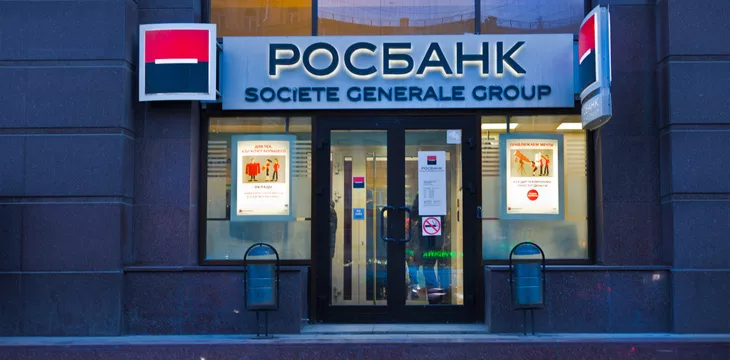|
Getting your Trinity Audio player ready...
|
Russia’s banking giant Rosbank has confirmed its plans to allow merchants to use digital currencies to settle cross-border transactions amid crippling economic sanctions.
Currently, the bank is conducting a pilot in collaboration with several corporate and private entities. The solution will see Rosbank rely on fintech firm B-crypto to provide operational and technological infrastructure “in full compliance with the law.”
The Bank of Russia is in stiff opposition to using digital currencies within the country’s borders but supports its usage in making international payments. Rosbank says its first-of-a-kind offer will see B-crypto purchase the digital currency abroad and submit the funds to a foreign supply without breaching existing regulations.
To facilitate the transaction, the local merchant will deposit fiat into an account at Rosbank upon receipt of an invoice and a digital currency address for payment. Rosbank transfers the funds to B-crypto to purchase the digital assets on behalf of the local merchant in compliance with Know Your Customer (KYC) rules.
At the moment, the amount of commission to be charged by B-crypto remains unclear, and the novelty of the offering makes it almost impossible to draw a conjecture. Vice President of the Association of Banks of Russia Alexey Voylukov remarked on the absence of such a solution among commercial banks in the country.
The service will cater primarily to corporate entities in the country but will not be geared toward individual retail usage. Despite its claims of compliance with the law, the Ministry of Finance and the central bank have yet to issue a statement supporting the offering.
Russian regulators have been scrambling for ideas to circumvent the barrage of economic sanctions put in place by Western powers. The Russian central bank and the Ministry of Finance agree on using digital currencies and a central bank digital currency (CBDC) as veritable methods to process international transactions.
In early 2023, the country was on the precipice of launching a national digital currency exchange but ditched the plans over disagreements with leading financial regulators.
Non-residents may be able to access the CBDC
Russian lawmakers are amending the draft bill for regulating its digital ruble pilot to allow foreign users to have increased access to the CBDC. The State Duma Committee on the Financial Market seeks to allow non-residents to transact with the digital ruble through foreign or central banks.
The Russian central bank is currently eyeing CBDC cross-border transactions with China and other allies. Despite lofty ambitions, the start of the CBDC pilot has been scuttled by the delay in implementing a legal framework to guide the experiments.
To learn more about central bank digital currencies and some of the design decisions that need to be considered when creating and launching it, read nChain’s CBDC playbook.
Watch: Blockchain and banking

 06-30-2025
06-30-2025 





